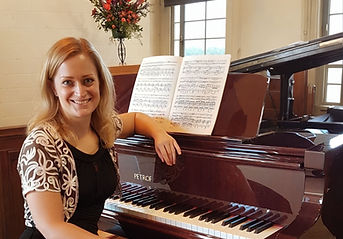


.jpg)

WELL-BEING COACH
Petra is an NHS-accredited Well-being coach, Stress Management coach, and a qualified DRU Yoga teacher. She is now pursuing her goal to become a fully qualified acupuncturist and attends a part-time BSc. degree course in York.
In her workshops, she focuses on stress management, using relaxation, breath work, meditation, visualisation, positive autosuggestions and other techniques. Petra also works with musicians and helps them prevent or overcome repetitive stress injury and performance anxiety.
She loves to combine music and sound with movement and relaxation in collaborative wellbeing workshops, such as 'Piano Pilates': Wellness inspired Piano Pilates helps promote wellbeing - DLUXE Magazine.
Her 'Healthy Posture and Movement' focuses on the challenges of being a professional musician or a serious music student. Petra has developed this course for Loughborough Music School where she works with a small groups of music scholars.
Petra studied Body Mapping, loosely based on the Alexander technique, designed specifically for instrumentalists, with Lisa Marsh and other specialists (mainly online from the USA from 2013 until 2019) to understand postural alignment and anatomy in movement for her piano practice and teaching.
Her interest in yoga has led her to pursue a DRU Yoga Teacher Training Course in Snowdonia (2015 - 2018) and Petra fully qualified in 2019. She further explored meditation and mindfulness as a CPD online, including 8-week Mindfulness Based Cognitive Therapy course with Oxford Mindfulness Centre, followed by the Autogenic training introductory course.
Petra has further studied Cognitive Behavioural Hypnotherapy and SMRB - Stress Management and Resilience Building to enhance her workshops and private practice.
Petra has created a 6-week course 'Wellbeing and Stress Management' for academic staff/educators (2023-24 worked with staff at University of Nottingham and Buckinghamshire New University), and a 4-week course 'Wellbeing and the Power of Sound'.
Her projects included workshops on wellbeing at the Festival of Rejection for University of Nottingham, School of Law and School of Business.
An example of a course/workshop:
-
Wellbeing and Stress Management
-
this course is structured in 6 hours (1 hour a week), with practices being given between the sessions
-
it can also be presented as a 1-day workshop
Week 1: Movement and Breath Work
At the beginning of the session we learn about what is stress response, types of stress response (fight/flight/freeze/fawn), sympathetic and parasympathetic nervous system, and how to activate relaxation response on purpose. We discuss various types of exercise and postural alignment, particularly in an office related situation. I then introduce a few practical yoga stretches and breathing practices.
Week 2: Mindfulness and Meditation
Reviewed breath work from week 1 as a part of mindfulness meditation practice. Mindfulness of the senses, emotions and thoughts will be explored in practical exercises. Introduction to brainwaves and how alpha/theta brainwaves occur during these practises, lowering stress levels and initiating natural healing processes. We discuss how to introduce mindfulness into our everyday activities.
Week 3: Relaxation, Autogenic Training and Autosuggestion techniques
Deep relaxation and autogenic training in practical exercises; learning how to reprogram the subconscious mind using positive auto-suggestions. Knowledge about brainwaves and relaxation response is explored further. Learning about the vagus nerve and its function, including exercises for its activation to promote relaxation response.
Week 4: Nutrition and Sleep
Discussing healthy nutrition and emotional eating/cravings. The 'Where-Why-How we eat' questions as opposed to only 'What we eat'. The science of sleep - circadian rhythms, daylight exposure etc. The impact of caffeine/alcohol/stress on our sleep. Exercise: yoga nidra (yogic 'sleep'). Further exploring theta and delta brain waves.
Week 5: Creativity and the Arts
'A state of Flow' as a measure of happiness. Exploring types of creativity and finding our own state of flow. Music - mindful listening - being fully present while listening and accepting our feelings. The benefits of sound healing - how sound waves can facilitate healing. Breathing exercise accompanied by live Tibetan bowls, followed by humming practice for vagus nerve toning.
Week 6: Positive Mindset and Emotions
Discussing elements of positive mindset, looking at cognitive distortions that can prevent positive thinking, understanding basic human emotions. Techniques - RAIN of self-compassion, loving kindness meditation, gratitude practice. Visualisation techniques to attract desired outcomes. Brain and heart coherence - communication between the heart and brain; how to achieve coherence by breath work and positive emotion.